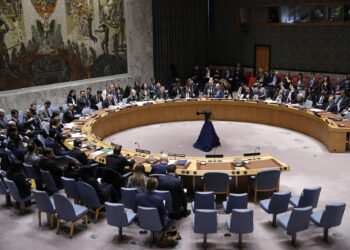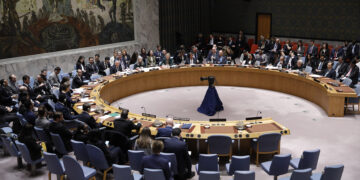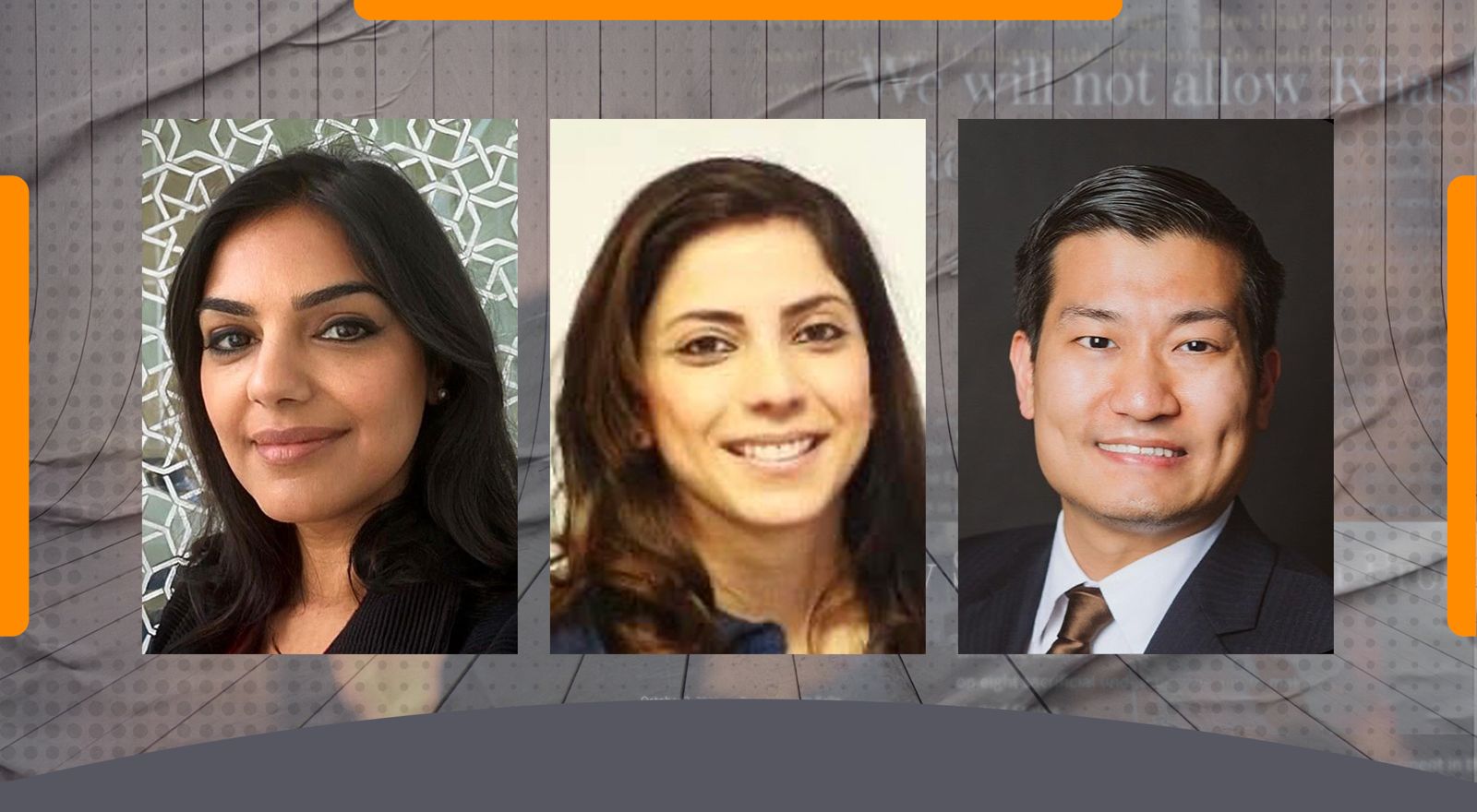Omid Memarian, a journalist, analyst and recipient of Human Rights Watch's Human Rights Defender Award, is the Director of Communications at DAWN.
عربی
"We have the obligation not to be complicit in terrible abuses that take place [in Saudi Arabia]," said prominent author and journalist Peter Beinart in an interview with Democracy for the Arab World Now (DAWN).
Discussing the role of the U.S. in the Middle and North Africa, Beinart said that the United States should push countries like the UAE, Turkey, Saudi Arabia, and Israel towards taking human rights more seriously, while recognizing that U.S. power in the region is not "unlimited."
Peter Beinart is a New York Times contributing opinion writer, the Editor-at-Large at Jewish Currents, and a professor at the Newmark School of Journalism at CUNY. He is also a writer at peterbeinart.substack.com.
Beinart told DAWN that, "although the progressives in the United States have been able to put some pressure on Biden on domestic policy, foreign policy, in general, remains much more insulated from public pressure."
In an interview with Democracy in Exile, Beinart spoke about President Biden's efforts to end the war in Yemen, U.S.-Saudi relations, the new "values-based foreign policy", the future of arms sales to Saudi Arabia and UAE, and the new administration's return to the nuclear deal with Iran.
Excerpts from the interview follow:
DAWN: President Biden has announced an end to US support for offensive Saudi-UAE operations in Yemen. Is it enough to stop the bloodshed in Yemen and end years of humanitarian crisis and Yemeni suffering?
Peter Beinart: I don't think it's enough by itself. There needs to be a diplomatic effort. Yemen is divided, you have the Saudis and Emiratis and others who still have a role there, and the U.S. military involvement is diminishing. But it's important that Biden is sending an special envoy and the focus will be on ending the war as opposed to essentially supporting one side in a proxy battle with Iran. That shift in orientation is very valuable.
DAWN: To what extent is the US public aware of what is happening in Yemen and the role the U.S. plays in the ongoing conflict there?
PB: I don't think most Americans are familiar with it, but over the past few years a group of progressives have started organizing around Yemen and were able to influence Members of Congress like Bernie Sanders, Chris Murphy, and others. They were able to shift the conversation inside the Democratic Party and ultimately influence the Biden Administration. That group believed that the United States was deeply culpable in what was happening in Yemen, and to their credit, they were able to organize and shift the foreign policy debate.
DAWN: Energy has been the cornerstone of U.S-Saudi relations for decades. How can Biden change that relationship in wake of the Kingdom's regional and domestic misconduct?
PB: The United States is more energy independent than it used to be and the U.S. wants to shift in general towards Asia. These two factors make a pivot away from Saudi Arabia possible. I think the United States still wants to have a relationship with Saudi Arabia. That said, Biden still said he would sell the Saudis defensive weapons- whatever exactly that means. We will see how Saudis react. The Biden administration simply wants to focus less on the Middle East overall.
DAWN: How much leverage has the U.S. in its relationship with Saudi Arabia and other countries in the region that are engaged in widespread rights abuses?
PB: The United States does not have the power to transform the domestic politics of Saudi Arabia, but we do have the obligation not to be complicit in terrible abuses that take place. What I would like to see is that the United States looks at Saudi Arabia, the UAE, Iran, Turkey, in many ways also at Israel, all countries that have serious human rights problems, and uses the leverage that we have to push them towards taking human rights more seriously. While recognizing our power is not unlimited, we should still try to push them towards regional peace, accommodation, and compromise, rather than these battles for power.
DAWN: President Biden has said that he will conduct a values-based foreign policy in the next four years. What would a values-oriented foreign policy look like in regards to these Middle countries?
PB: The U.S. is offering aid, weaponry, and military protection, to Egypt, as in the case of Saudi and the UAE. The truth is that America has never had a really primarily values-led foreign policy. Even those presidents who made some efforts in that regard, let's say, Jimmy Carter and Barack Obama, were very limited by this strong sense of American national interest. The Biden administration will be very influenced by the U.S. competition with China, which will limit how much it actually ends up stressing questions of human rights, I'm afraid. Especially because countries will be able to threaten the Biden administration, saying if the U.S. cuts them off they will develop relationships with China or Russia and get their support there. It's still important that the United States does what it can. Even if other countries like Russia or China are willing to put their back into things, it doesn't make it right for the United States to do that.
For instance, America should ask why it makes sense to give military aid to Egypt. That was a payoff in the Camp David agreement. Sisi has his own reasons for wanting to keep peace with Israel. He is not going to break peace with Israel just because he doesn't get U.S. money. And I don't see any good reasons for us to be sending weapons to a regime like the UAE or Saudi Arabia. The UAE is taking these weapons and getting involved in proxy wars all over the place. I don't see a compelling reason for us to do any of that.
DAWN: How feasible is the complete cessation of arms sales to these countries?
PB: From what I've seen it's not like that the U.S. defense contractors are so valuable in terms of creating American jobs. There are many more productive ways to create jobs. A lot of that has to do with the fact that defense contractors are very influential in Washington. They fund a lot of politicians and there are a lot of people in government, including in the Biden Administration, who worked for defense contractors when they were out of government. Part of what we need to look at is the kind of corruption that exists in the ways in which defense contractors use their influence with Congress and in the foreign policy world.
DAWN: How big an obstacle for a values-based foreign policy is the 'revolving door' you describe?
PB: It's bad for American foreign policy and ultimately for America. I don't know if it's going to be bad for Joe Biden politically, because it's so taken for granted. The problem is that although the progressives in the United States have been able to put some pressure on Biden on domestic policy, foreign policy, in general, remains much more insulated from public pressure. Progressives were not able to generate enough pressure on Biden to make him rethink this normal practice of giving ex-lobbyists jobs. We need to get to a situation where people who leave the government don't take those jobs because they worry that if they take the jobs they won't be able to get a job back in the government. If you go work for Goldman Sachs as an economic advisor, people now think twice because they know that people in the Democratic Party will protest if Democrats give the top jobs to people from Wall Street. But on foreign policy, we haven't gotten to that place yet.
DAWN: How likely is it that the Biden Administration will become more progressive in foreign policy?
PB: On foreign policy, I don't think it's very likely, I'm afraid. Biden is not going to face that much pressure. Frankly, he would see more pressure from the right to take a hawkish position on China, to not be too soft on Iran. There are issues like climate change where the public pressure has led him to take these things seriously. Other than that, on foreign policy, my expectations are not that high.
DAWN: Biden certainly can't run a value-based foreign policy if he doesn't firmly address the murder of Jamal Khashoggi. What should the U.S. do to bring justice for Khashoggi?
PT: We are doing some things, like opposing the arms sales, or some of the arms sales, publishing the [DNI] report. I don't think it's that likely that the U.S. will go beyond doing more than that. I would like to be wrong. The U.S. still sees Saudi Arabia as some kind of ally, and the truth is that when it comes to U.S. allies, the U.S. tends not to prioritize human rights. So I wouldn't expect a lot more than those specific actions. But again, even that is certainly progress from where we were with Donald Trump.
The harsh reality when it comes to U.S. allies, the U.S. sometimes is willing to take some steps in fighting for human rights, but it's usually not willing to take dramatic steps that could imperil the relationship.
DAWN: Iran is going to be a major foreign policy issue for the Biden admin. The Secretary of State, Anthony Blinken, recently appointed International Crisis Group's chief Rob Malley as the Iran envoy. What do you think about this appointment?
PB: It's a great appointment. First of all Rob Malley has already dealt with Iranians and all the other players here. He is someone who understands the issues and already knows the background. It's important to have someone with that kind of experience. I also think that Rob Malley has a good close relationship with Tony Blinken, Jake Sullivan and the other key policymakers. He is a thoughtful person, someone who has a deep knowledge of the Middle East and Europe. He holds a perspective beyond conventional lines in Washington. I couldn't think of anyone better.
DAWN: As the Iranian regime has increased in cruelty over recent years, and the Revolutionary Guards have captured key institutions, how do you think the United States' policy of maximum pressure has affected human rights in Iran?
PB: The record is that the U.S. maximum pressure sanctions policy has not helped the cause of human rights or freedom in Iran. It just made things worse for Iranians who are already suffering. The sanctions tend to hurt ordinary people much more than they hurt the government. It would be wonderful for there to be a completely different government in Iran. I don't think it's within America's power to bring that about. But I do think it's in America's power to negotiate a nuclear agreement where Iran is not getting a nuclear weapon and in which the crushing sanctions are lifted so Iranians can get medicines and the basic necessities of life. Perhaps if there is more openness between Iran and Europe and the United States, maybe ultimately that will also help the cause of freedom.
I'm not saying the United States should not speak about human rights and freedom in Iran. We should. We should condemn human rights abuses. We should speak on behalf of dissidents. But to my mind, it's completely false to suggest that the policy the Trump administration was pursuing was actually promoting human rights.
DAWN: Do you see similarities between the struggle for universal democracy in Israel/Palestine, for example, the five million Palestinians ruled by Israeli authorities they did not select, and parallel struggles in other MENA countries where people are denied meaningful democratic participation?
PT: I think those parallels are maybe easier to see now in the wake of the Abraham Accords. You have basically an authoritarian government that violates human rights in Israel in alliance with these governments that are violating human rights in the UAE or Bahrain or Morocco in Western Sahara. It would be wonderful if there could be more of an alliance of people who care about democracy in Israel/Palestine and people who care about democracy in the Gulf and people who care about democracy in Sudan, Morocco, and Western Sahara.
DAWN: What are the barriers to the U.S. taking a stronger approach to demanding democracy in Israel/Palestine?
PT: I don't think there is a sufficient understanding in the United States simply that Israel is not a democracy for most Palestinians. That basic understanding is often really not conveyed very clearly in American public debate that Israel controls the lives of millions of Palestinians who cannot vote for the government that dominates their lives. We still have a long way to go in the United States just to make that the baseline understanding of the conversation. Once you do, then it forces Americans to ask the question of why we are supporting these anti-democratic policies and protecting Israel from suffering any consequences.
DAWN: Is it consistent with a values-based foreign policy that the U.S. goes after human rights violations in many Middle Eastern countries, but not Israel?
PT: It's not consistent and makes America look hypocritical. But it's totally possible to do it because the politics are different. There is a much stronger set of constituencies in the United States which are dedicated to ensuring America's support for the Israeli government in a way that they are not in other countries.
DAWN: Many in Washington, including Bernie Sanders, believe that if Biden isn't bold and decisive, Democrats will lose control of Congress in 2022. When it comes to foreign policy issues, what does "bold" mean?
PB: In the Middle East it would mean reentering the JCPOA and trying to end the cold war between Iran and Israel and the Gulf States. It would mean being willing to put conditions on U.S. military aid to Israel in order to push Israel to change its policies, at least make sure America is not as complicit. It would mean thinking about cutting or eliminating U.S. military aid to Egypt as long as that government remains so brutal.
* Jack Steele and Theodore Nappo contributed to this interview.
***
Photo credit: Center for American Progress, Flicker.






































